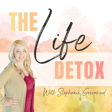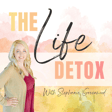
Protecting our children (esp. daughters) from the harms of social media
Today I’m speaking with award-winning author, Donna Jackson Nakazawa about her personal journey with childhood-trauma-induced autoimmune disorders, her career as a writer, and her new book, Girls on the Brink. She details how today’s environment, especially with the advent of social media, is harming children, especially girls, mentally and physically at a critical point in development. She also tells us how we can help our daughters and tells us about a simple way to heal.
The Life Detox is brought to you by bubbleandbee.com
Donna Jackson Nakazawa is an award-winning science journalist, author of seven books, and an internationally-recognized speaker whose work explores the intersection of neurobiology and human emotion. Her latest book, Girls on the Brink: Helping Our Daughters Thrive in an Era of Increased Anxiety, Depression, and Social Media, was named one of the best books of 2022 by The Washington Post and Mashable. Donna’s other books include The Angel and the Assassin: The Tiny Brain Cell That Changed the Course of Medicine, named one of the best books of 2020 by Wired magazine; Childhood Disrupted, a finalist for the Books for a Better Life Award; and The Last Best Cure. Her writing has appeared in Wired, The Boston Globe, Stat, The Washington Post and Health Affairs. She has appeared on The Today Show and NPR and is a regular speaker at universities, including the Harvard Science Library Series, UCLA Health, Rutgers University, Johns Hopkins, Learning & the Brain, Children’s Hospital Association, and the University of Arizona. Donna is also the creator and founder of the narrative writing-to-heal programs, Breaking Free From Trauma, and Your Healing Narrative, which help participants to create a new, powerful, inner healing narrative that calms the body, brain, and nervous system.
You can find her at donnajacksonnakazawa.com or on:
Instagram: @DonnaJacksonNakazawa
Twitter: @DonnaJackNak
Facebook: @donnajacksonnakazawaauthor

